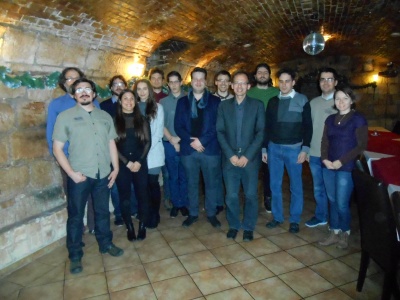Our research group
Our group’s research focuses on theoretical and experimental characterization of point defects in semiconductors and semiconductor nanostructures. We are developing and implementing new techniques for introducing dopants and defects in semiconductor (nano)structures, and studying their properties by experimental and theoretical spectroscopy tools.
We combine heat combustion, ion or neutron irradiation, colloid chemistry and related techniques to fabricate semiconductor nanostructures. Our focus is on silicon carbide to realize ultimate in vivo bioimaging agents. We are active in the field of computational materials science and has a large experience in using density functional theory (DFT) based methods in solids and nanostructures. The group leader started to apply advanced hybrid density functional theory methods on defects in bulk and nanostructured semiconductors already from 2002. From 2005 the GW method was also applied. Advanced time-dependent DFT (TDDFT) has been employed to determine the absorption spectrum of nanoclusters since 2008. These theories were utilized directly to defect engineering in bulk semiconductors and in their oxide interface, biomarkers, solid state quantum bits and spintronics, solar cells and related topics.
Group members
- Group leader
- Adam Gali
- Postdoc fellows
- Dávid Beke
- Gergő Thiering
- Anton Pershin
- Vladimir Verkhovlyuk
- Song Li
- Bian Guodong
- Nikoletta Jegenyés
- Graduate students
- Nima Ghafari Cherati
- Péter Rózsa
- Szabolcs Czene
- Mihály Mátyás Rudolf
- Sarah Morais Bezerra
- Meysam Mohseni
- Undergraduate students
- Balázs Tóth
- Zoltán Sántha
- Laboratory Assistants and Engineers
- János Tamási
- István Balogh
- Laura Kocsor
- Guest Researchers
- Pei Li
- Afonso Lamelas
Former members
- Márton Vörös (industry)
- Tamás Hornos (industry)
- Hugo Pinto (now PostDoc at Adam Foster group)
- Thomas Chanier (now PostDoc at Namur University)
- Tamás Demján (industry)
- Attila Szállás (industry)
- Elisa Londero (now staff at Observatory of Trieste)
- Krisztián Szász (now Postdoc at Budapest University of Technology and Economics)
- Jyh-Pin Chou (now assistant professor at National Changhua University of Education, Taiwan)
- Emilie Bruyer (industry)
- Balázs Juhász (industry)
- Philipp Auburger (industry)
- Gyula Károlyházy
- Naina Mukesh
- Bálint Somogyi (industry: Semilab Ltd.)
- Hanen Hamdi
- Zoltán Bodrog
- Viktor Ivády (associate professor at Eötvös Loránd University)
Research partners around the world
- Jörg Wrachtrup at Stuttgart University
- Fedor Jelezko at Institut für Quantenoptik (Ulm University)
- David D. Awschalom at The Institute for Molecular Engineering (University of Chicago)
- Milos Nesladek at Hasselt University and IMEC
- Brett Johnson at University of Melbourne
- Stefania Castalletto at RMIT, Melbourne
- Jeronimo R. Maze at Pontifícia Universidad Catolica
- Norikazu Mizouchi at Kyoto University
- Efthimios Kaxiras at Harvard University
- Mikhail Lukin at Harvard University
- Nathalie de Leon at Princeton University
- Dmitry Budker at Berkeley University & Johannes Guttenberg Universität
See also
People around (members, former members, partner colleagues)
